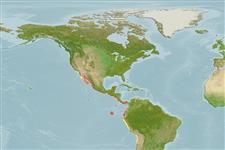分類 / Names
共通名の | 類義語 | Catalog of Fishes(部類, 種) | ITIS | CoL | WoRMS | Cloffa
>
Scombriformes (Mackerels) >
Scombridae (Mackerels, tunas, bonitos) > Scombrinae
Etymology: Scomberomorus: Latin, scomber = mackerel + Greek, moros = silly, stupid (Ref. 45335).
More on authors: Jordan & Starks.
Environment: milieu / climate zone / depth range / distribution range
生態学
海; 海洋回遊性 (Ref. 51243); 深さの範囲 10 - 60 m (Ref. 91172). Tropical; 33°N - 27°S, 121°W - 70°W (Ref. 168)
Eastern Central Pacific: La Jolla in southern California, USA to the Galapagos Islands and Paita, Peru. Recently reported from Antofagasta, Chile. Many authors have erroneously considered this species to be a synonym of Scomberomorus maculatus, or a subspecies of it.
Length at first maturity / サイズ / 重さ / 年齢
Maturity: Lm 43.9, range 26 - 32 cm
Max length : 99.0 cm FL オス/雌雄の選別がない; (Ref. 40637); common length : 60.0 cm FL オス/雌雄の選別がない; (Ref. 168); 最大公表体重: 8.2 kg (Ref. 4699)
背面の脊椎 (合計) : 15 - 18; 背鰭 (合計) : 16 - 19; 臀鰭: 16 - 21; 脊つい: 46 - 49. Interpelvic process small and bifid. Body covered with small scales. Lateral line gradually curving down toward caudal peduncle. Intestine with 2 folds and 3 limbs. Swim bladder absent. Pelvic fins relatively long. Sides silvery with numerous round brownish (orange in life) spots, three rows above lateral line, one above. The first dorsal fin is black distally and white at the base. The second dorsal fin is tinged with yellowish and with black margin. The anal fin is white.
A schooling species believed to spawn close to the coast over most of its range. Adults occur near the surface of coastal waters to over bottom of the continental shelf (Ref. 11035). Adults feed on small fishes, particularly anchovies (Anchoa and Cetengraulis) and clupeids (Odontognathus and Opisthonema). The most abundant game fish along the Pacific coasts of Mexico and Central America. An excellent food fish enough to support a commercial fishery. Marketed fresh and frozen; also used for ceviche (Ref. 9987).
Life cycle and mating behavior
Maturities | 繁殖 | Spawnings | Egg(s) | Fecundities | 幼生
Collette, B.B. and C.E. Nauen, 1983. FAO Species Catalogue. Vol. 2. Scombrids of the world. An annotated and illustrated catalogue of tunas, mackerels, bonitos and related species known to date. Rome: FAO. FAO Fish. Synop. 125(2):137 p. (Ref. 168)
Human uses
水産業: 商業; ゲームフィッシュ: はい
用具
特記事項
XMLをダウンロードして下さい
インターネットの情報源
Estimates based on models
Preferred temperature (Ref.
123201): 19.4 - 28.9, mean 25.8 °C (based on 80 cells).
Phylogenetic diversity index (Ref.
82804): PD
50 = 0.5000 [Uniqueness, from 0.5 = low to 2.0 = high].
Bayesian length-weight: a=0.00617 (0.00404 - 0.00942), b=2.93 (2.81 - 3.05), in cm total length, based on LWR estimates for this species & Genus-body shape (Ref.
93245).
栄養段階 (Ref.
69278): 4.5 ±0.8 se; based on diet studies.
回復力 (Ref.
120179): 手段, 1.4年~4.4年の倍増期間の最小個体群 (Assuming tm=2-4).
Prior r = 0.57, 95% CL = 0.37 - 0.85, Based on 1 data-limited stock assessment.
Fishing Vulnerability (Ref.
59153): Moderate to high vulnerability (51 of 100).
Climate Vulnerability (Ref.
125649): High vulnerability (64 of 100).
Nutrients (Ref.
124155): Calcium = 32.7 [14.5, 115.5] mg/100g; Iron = 0.827 [0.363, 2.008] mg/100g; Protein = 20.7 [19.4, 21.9] %; Omega3 = 0.253 [0.153, 0.419] g/100g; Selenium = 54.2 [19.9, 174.5] μg/100g; VitaminA = 23.4 [5.6, 102.0] μg/100g; Zinc = 0.651 [0.429, 1.035] mg/100g (wet weight);
